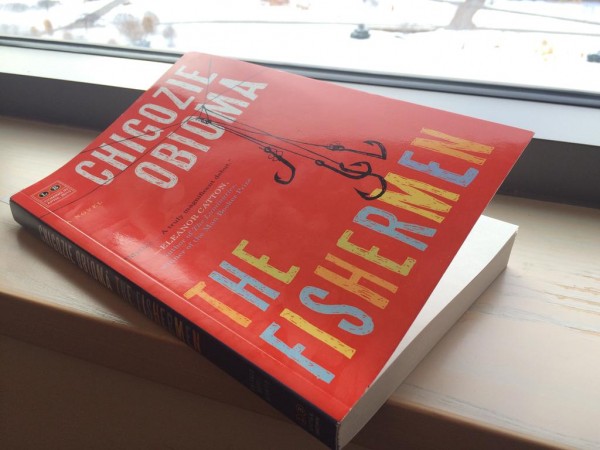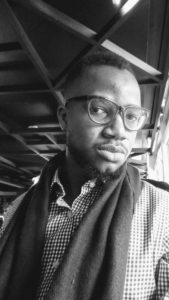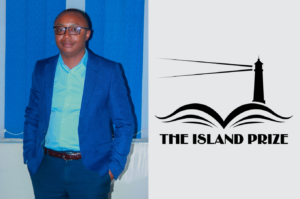
“Every writer has only one story to tell,” James Baldwin once wrote, “and he has to find a way of telling it until the meaning becomes clearer and clearer, until the story becomes at once more narrow and larger, more and more precise; more and more reverberating.” We do not know if for Chigozie Obioma that one story is The Fishermen, but we can conclude that it is a story not just well told, but told precisely and with a meaning that reverberates.
A story of kinship, sibling rivalry, sibling bond and, to some degree, the pitfalls of single parenting, The Fishermen chronicles the lives of four brothers who take advantage of their father’s absence to explore their neighbourhood. They discover an ominous river and a mad man whose curse changes their lives. From the first chapter, Obioma establishes an aura of doom for the four main characters: Ikenna, Boja, Obembe and Ben who are likened to a Python, Fungus, Searchdog and Moth. Their mum (The Falconer) pleads with their dad (The Eagle) not to abandon her with four adolescent boys, way before their encounter with Abulu the Madman (The Leviathan).
Obioma’s own family background isn’t much different from his characters’ and this exposes the fractious nature of Nigeria’s supposed unity—especially in this time of great political uncertainty and divisions with Nigerians still aligning with political figures out of regional allegiance than principle and competence. It matters not if you could, like Chigozie Obioma himself can, read Fagunwa’s Ogboju ode ninu Igbo Irumole better than most Yoruba kids or sing Kwam 1’s or Olamide’s songs, you remain an Omo yibo. This was the case in the ’90s in Akure where The Fishermen is set. This is still the case in 2018, 45 years after Yakubu Gowon established the National Youth Service Corps (NYSC) to foster unity among Nigeria’s diverse tribes, and this may just be the case for the next forty-five years if Nigerians continued in the folie à plusieurs that is One Nigeria without forging and embracing a better governing formula.
The Fishermen is an upsetting novel that is as deeply psychological as it is morbid; wrought sinewy with the intensity of one intending to shatter the reader’s mind. It deceives the reader into accepting the reunion between Obembe and Ben as a happy ending when, in reality, the reader is left unsettled and discomfited at how implausibly plausible the story is, which is perhaps why Gbolahan Obisesan and Jack McNamara start the play—which has graced stages in Manchester and Edinburgh, where it won The Stage Award at the Edinburgh Fringe Festival—from the end of the book.
Michael Ajao, who made his screen debut in Attack the Block, has appeared in productions such as Lord of the Flies. He is terrific as Ben, Boja, Mrs Agwu, Abulu and, for a brief period, Ikenna. But it is his acting as Ben and Abulu that he captures best. In his role as Abulu where he pronounces his curse on Ikenna, he is a beast. The lights on stage do their magic, no doubt, but it is his delivery that makes the scene outrageously scry.
There’s an almost morbid take on precision and clarity in the novel as evidenced by the vivid description given to cockroaches, Abulu’s shifty appearance and the step by step manner in with which Boja must have died following his dive into the well:
The plunge, I pictured, must have been quick. As his head sank, it must have first hit the rock that protruded from the side of the well. This contact must have been followed in succession by the sound of bursting, of crashing skull, of breaking bones, of blood purling, then spilling and swirling in his head. His brain must have scattered into smithereens, the veins that connected it to other parts of his head uncoupling. His tongue must have thrust out of his mouth at the moment of the contact, tearing his eardrums apart like an antique veil, and pouring a tenth of his teeth into the floor of his mouth like a pack of dice. A synchrony of noiseless reactions must have followed this. For a short time, his mouth must have kept uttering something inaudible, like of pot of boiling water bubbling as his body convulsed. This must have been the peak of it all. The convulsion must have started to gradually let go of him, calm returning to his bones. Then a peace not of this world must have descended on him, calming him to deadly stillness.
—description that would have been no doubt difficult to pull off on stage. But Obisesan avoids such pitfalls and many others with the clever narration provided by actors Ajao and Valentine Olukoga and their back and forth transmutation into the seven central characters in the book.
The play doesn’t fail to score some political points as depicted in a scene where Valentine Olukoga as Mr Agwu bemoans Nigeria’s political structure, the perpetual marginalisation of the Igbo, and decries the killings of Biafrans in the Civil War of 1967-1970.
The Fishermen’s shortlisting for the Booker Prize in 2015 came as a surprise to some literary enthusiasts in Nigeria, in part due to how relatively unknown Obioma was to the heavyweight duo of Chimamanda Ngozi Adichie and Teju Cole, who Obioma has termed contemporaries—a challengeable assertion. This surprise was further greeted with some ridicule when many read the novel and discovered his slavish attempts at clarifying Nigerian terms, something that was hardly done in the play except at the scene where Obembe and Ben go to call the neighbourhood Mechanic to come separate their fighting brothers exclaiming, ‘Eje yen ti poju; the blood is too much.’ That year’s Booker Prize would go to Marlon James’ A Brief History of Seven Killings. But The Fishermen would go on to be translated into 27 languages—so far—a huge feat for a book that was rejected multiple times because of its implausibility.
For a book with so much vivid content, the technique employed by Obisesan, which pleasantly avoids too many characters by having just two actors narrate and transmute into other characters, is worthy of note as it turns the play into a simple, stylish delivery that lacks pretension, thereby almost bettering the book. It is taut and absorbing and, more than the book, renders a comic feel to an otherwise tragic story. Jack McNamara’s directing is gripping from the start and the ease with which Valentine and Michael segue into the different characters is as complex as it is effortless. There are no rough edges and the ease with which both actors carry out this onerous task makes one overlook how difficult it would ordinarily be if not for their sleight.
For Obioma, who believes in immanence and once said that “Everything we do is pre-ordained,” that a madman’s prophesy would severe filial ties and crush a family isn’t far reaching and would be hardly contested by many Africans and Nigerians, especially those who heavily rely on the supernatural in their daily dealings.
There are many The Fishermen stories in every corner of Nigeria begging to be told. Most will never be told. Many will be told (on Facebook and Twitter threads), but not well. And the few like Obioma’s that would be told well would only be heard of because of western aid. Sad as this is to reckon with, the successes of both the novel and play versions of The Fishermen drive home the point that the West remains the hope of “African Literature,” and even if the proverbial lion begins to tell his stories, the glory will still be the Hunters’—the universities admitting us into free MFA programs, the publishing houses offering us book deals with the condition that the books be more West-appealing, the festivals willing to showcase and promote our narratives. And while this may be the situation for the foreseeable future, the onus is on African Writers to insist like Adichie does and Obioma has done (by keeping Abulu, making him believable and refusing to have his story classified as magical realism rather than social realism) to preserve our narratives in their original form without fear and to tell every one of them like Baldwin suggested, until their meanings become narrower and larger, more precise, and more reverberating.
About the Writer:
 Osareme Edeoghon is an afropop critic and literary enthusiast. He studied medicine in Nigeria. He writes from Glasgow where he works as a doctor.
Osareme Edeoghon is an afropop critic and literary enthusiast. He studied medicine in Nigeria. He writes from Glasgow where he works as a doctor.









Grace Olabanji February 27, 2021 12:00
Wow I feel like I have seen the play already. Point well driven.